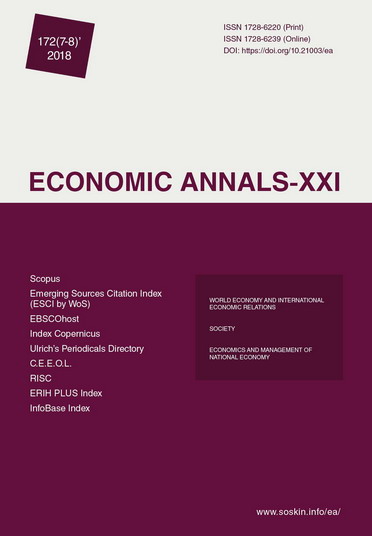Digital transformation of Ukraine: challenges of theory and practice in implementation of digital quality of life
Digital transformation of Ukraine: challenges of theory and practice in implementation of digital quality of life
Author(s): Viktorya Boronos, Iryna Plikus, Vadym Aleksandrov, Nataliia AntoniukSubject(s): Economy, ICT Information and Communications Technologies
Published by: Institute of Society Transformation
Keywords: Digital Space; Digital Economy; Transformation Potential; Digital Quality of Life; Indicators of Digital Quality of Life;
Summary/Abstract: Introduction. The complexity of predicting the digitalisation processes with regard to all existing challenges and potentials of digital transformation raises the relevance of both theoretical and empirical studies related to the indicators development that allow analysing the current level of digitalisation of the socio-economic development of the territory, the transformational potential, the digital quality of life and the creation of methods for its evaluation, as well as determining the perspective directions in the digitalisation policy. The purpose of the article is to develop methodological approaches to the evaluation of the digital quality of life. Methods. The methods of formalisation, hypothetical assumption, system approach and scientific abstraction were used in the study. The Pareto principle and the ABC analysis method were used while determining the transformational potential (the significance of the digital space components tendency). In the developing of the indicators for assessing the digital quality of life in terms of the digital space components the process approach and the EFQM excellence model were used. The basis for calculating each indicator is the method of linear scaling. Results. The paper proposes a conceptual model of the digital transformation in the economy and society which is represented both from the position of three digital spaces: business, education and science, state and society and from the viewpoint of process-industrial and technological approaches. In this model, the functions of business, education and science, the state and society are mutually complementary. It is suggested to monitor the development of individual components of the digital space in two directions: 1) the readiness of each component to digital transformations; 2) the use of information and communication technologies and their impact on the development of the specific component of the digital space and the quality of digital life. This approach to monitoring allows us to assess the digital quality of life. A methodology for assessing digital quality has been developed and indicators for its evaluation have been proposed. The assessment of the digital quality of life on average in the European Union (EU) and Ukraine by components of the territory’s digital space for 2015 showed that the EU requires progress in the dissemination of digital public services (0.39) and the integration of digital technologies into business activities (0.48), Ukraine is far behind the EU in terms of the digital quality of life. Conclusions. In comparison with similar studies, the proposed methodology for assessing the digital quality of life allows us to identify problem areas and competitive advantages of digitalisation of the economy and society, and provides the ability to model the development the level of the digital quality of life in view of changing conditions.
Journal: Економічний часопис - ХХІ
- Issue Year: 172/2018
- Issue No: 7-8
- Page Range: 38-43
- Page Count: 6
- Language: English

